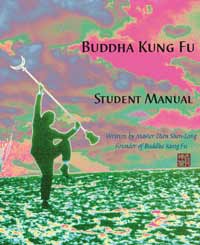| OUR FOUNDER | BOOKs CDs DVDs | BUDDHISM BASICS | CYBERTEMPLE | PODCASTS | SEMINARS | shaolinINTERACTIVE | DONATIONS |

Buddha Zhen
Buddhist Scientist,
American Philospher,
Poet,
Novelist,
Essayist,
Composer,
Musician,
Kung Fu Shifu,
Tai Chi Master,
Freemason
For more Buddhist self-help: |

Tai Chi Magic 1
by Buddha Zhen
8.88

Buddha Builder Book
Download now for $18.88
For more Buddhist self-help:
Visit Buddha Zhen's new website:
ACTzen.com

BUDDHA ARGUMENTS
The original Buddha spent plenty of time arguing with other spiritual leaders, politicians, and the public. Realizing that his Disciples would be faced with the same plight with different questions...Shakyamuni Buddha devised the following guidelines to make any argument more efficient, less frustrating, and more beneficial.
Put yourself in the same place as your opponent.
Rather than just pushing your own point forward, first, understand what their goal or intention is. What understanding is your opponent seeking or protecting? This is another version of compassion. Start by seeing the question or understanding from their point. When you look at the issue from their position/perspective--what do you see? Now you can fathom the distance between your perspective and theirs.
Start with same point of view as opponent.
Once you understand your opponent's viewpoint, agree with them. Their understanding is their truth. Now, move their perspective one step forward. Don't make them jump the canyon to your viewpoint. Lead them down the path and up the other side like a child holding your hand. Of course, don't be condescending, insulting, or belittling. Just get them to agree one step at a time that you both agree on each new point.
Use opponent's expressions.
Shakyamuni Buddha was very liberal about translating his Dharma and lectures. He specified to his Disciples that it was more valuable to change his wording and make it easier for someone to understand his lessons than it was to treat his words as 'gospel.' He understood that different cultures and cities had different expressions that could also be used to make his lessons more appealing and familiar. Buddha stated that words are merely the vehicle of enlightenment, not the enlightenment.
LEAD opponent to Buddhist viewpoint.
If you know the destination of your argument, you can lead your opponent their, even when they think they are 'winning' the argument. As long as you are leading them or in harmony with them to some extent, progress is being made. If you are battling with words you are wasting your time and alienating them from the Dharma.
Be: refined
People don't seek enlightenment from streetcorner bums. Somehow you must project a level of skill, enlightenment, contentment, satisfaction, health, or awareness that is appealing to your opponent. If your opponent does not want what you posess, you won't be able to interest him/her.
Be: skillful
Skill requires experience and focus. Even doing something does not produce skill without diligence and focus. Learn to understand the Dharma, then learn how to express the Dharma. To be able to recognize a tree is easier than trying to describe it to someone who has never seen one.
Be: suave
One of Buddhisms greatest attributes is the ability to be cool. This means being calm when others get excited. Be friendly when others are angry. Be composed when others are frustrated. Be dignified yet speak the common language. Remember that you want to present yourself as someone who is more civilized and better mannered than they would be without Buddhism.
polite
It's easy to be polite when others are polite to you. However, real politeness is the ability to be well-mannered, and good-natured even when threats, insults, and anger are hurled at you.
Emit a supernatural radiance
By being polite, suave, skillful, and refined, you will appear more developed than the common man. This ability to exceed normal communication skills and control your emotions will be perceived as a supernatural radiance. It will calm those who are more emotional (perhaps not initially) and impress those who are cunning and clever.
See into past and future.
Buddhism seeks to conquer one's life in the current moment by having a knowledge of the past and an awareness of the future. History classes are a good start for teenagers. The next step though is to see your own personal history with clarity. Then look into your parents' history. Then understand your friends' history. Eventually, you will become more aware of the history of a stranger as certain words reveal similar experiences to those you've already studied. This ability to be sensitive to someone else's history is the foundation for understanding their current life and dilemas.
Unfortunately, the future is never written, and even when it becomes the past, may not even be clearly understood by those who participated in it. So, as a Buddhist, we will never really know or understand everything. Just do your best. Keep looking into the past of others. Dig into the lives of those you know and meet. Want what is best for them and hopefully you will improve the future of everyone you contact and many people you may not even see.
Rise through IMPERFECTIONS by gradual conquests.
Like a carpenter repairing an old boat: fix each leak and plug each hole. You don't throw the can of paint at the boat, you apply the paint little by little.
1. Addictions to senses
This is the simplest and most common ailment for any living being. We are born with senses that ensure our survival and keep us healthy. Rather than being born with a message in our brain that commands us to eat at noon everyday, we are born with senses that detect when our blood sugar is low and food needs to be consumed. Acknowledge what is natural and unconquerable. You can't stop someone from being hungry but you can train them to eat certain foods at certain times.
2. Lust for life
Survival is inate in all creatures. Even insects will flee from danger. The 'Lust For Life' is more advanced. A dog may seek certain comforts but probably doesn't sit down and reflect on how wonderful life is. Greed is even more advanced and no one wants to die. Rather than convincing people that death is more wonderful than life, explain how Buddhism makes life more enjoyable and rewarding. Just as Bodhidharma explained to the Chinese Emperor that his donations to Buddhism and temples he built were not going to change his placement in Heaven (this really upset the Emperor), explain how the rewards of being a good Buddhist are beneficial NOW in this life.
3. Speculative mentality
People think in terms of 'cause and effect.' If they help someone paint their fence, they expect help in painting their fence. People invest their efforts and time selfishly. This is natural. So, appeal to this 'give and take' thinking. To keep your opponent interested in your argument offer something. "Let's continue our discussion of Buddhism while you paint your fence. I'll even hold your bucket for you as we talk..."
4. Ignorance
People are animals. Sometimes it is enlightening to imagine what kind of animal your opponent would be. If you imagine them as a bear, then talk in bear symbolisms: "You have to get your feet wet to catch a fish in the stream." It is easy to expect too much from people. What is easy for you to understand may seem impossible for someone else to grasp. Just as in mathematics, a person must comprehend the simpler concepts before they are capable of the more advanced formulas.
Zhen Shen-Lang,
November 7, 2002
-
Disciple-Z / arguingZ.html -
-
"Disciple Pages p2: Buddha Arguments" -
